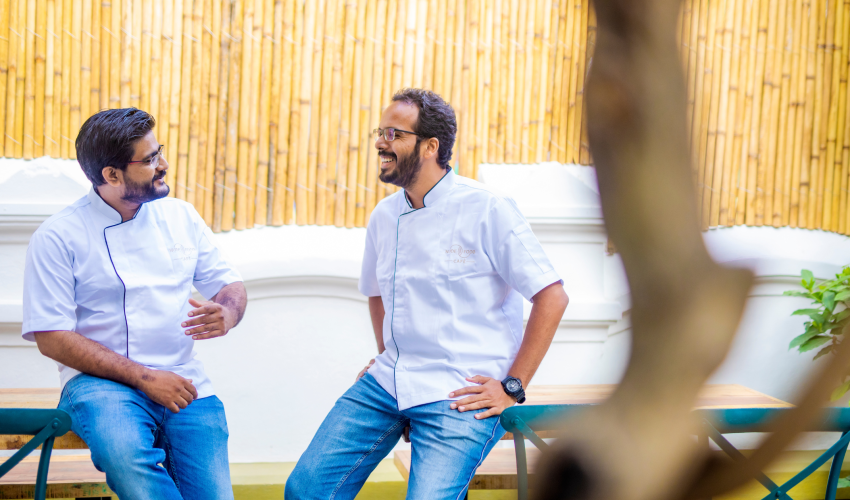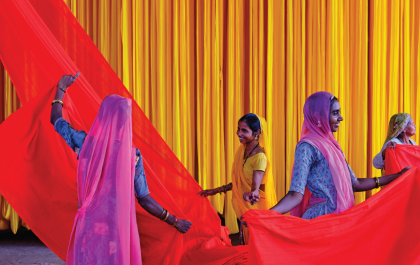By Ananya Swaroop
Zero Waste is the buzzword everywhere today, and people from all spectrums of life are trying to be a part of it. Blame it on social media to make sustainability look cool, but conscious spending of environmental resources is the need of the hour. We talk to a few people who are already a part of this journey
“Think of an elaborate scene from a series like Game of Thrones — the production would have invested in elaborate dresses for the characters, infinite props, all sorts of makeup products, and other on-screen items but additionally off-screen they would have procured n number of batteries, chemicals, zip ties, ropes, and what not to showcase their vision. Plus, there are endless plastic water bottles, food leftovers, single-use toiletries, and other essentials the crew uses during this time. Alas, once the filming is done, all of it just reaches landfills and the chemical waste is often disposed of carelessly in water,” exclaims Pragya Kapoor, the co-founder of Guy In The Sky Pictures production house.
According to the Ministry of Housing and Urban Affairs, Government of India, urban India produces about 42.0 million tons of municipal solid waste annually, i.e. 1.15 lakh metric tons per day (TPD), out of which 83,378 TPD is generated in 423 Class-I cities. Waste generated in 423 Class-I cities works out to 72.5 per cent of the total waste generated each day. These alarming statistics are reason enough for us to become environment-conscious. Fortunately, some Zero Waste Advocates have taken it upon themselves to bring in the change.
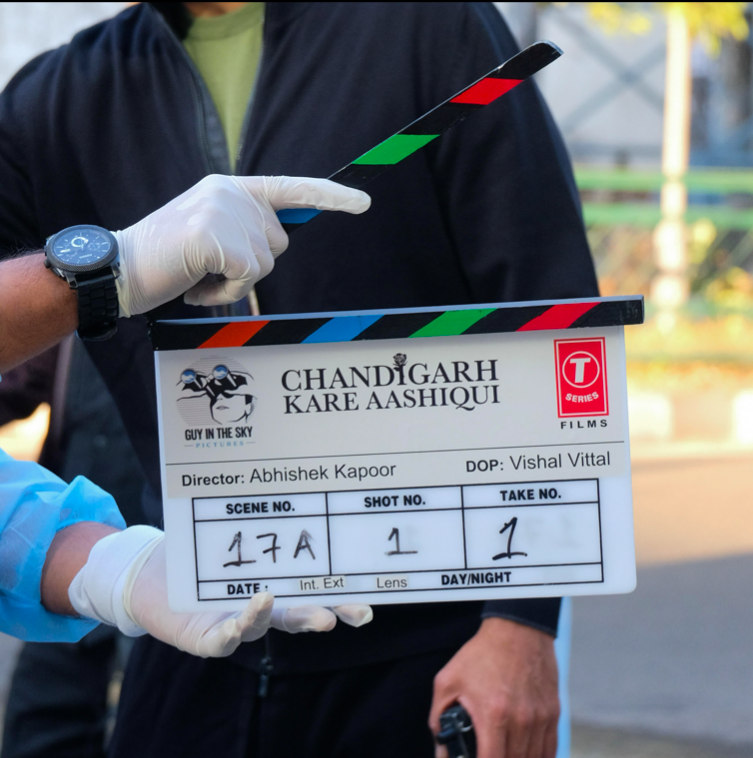
Kapoor is doing her bit on the sets of her films. Back in 2021, Chandigarh Kare Aashiqui created quite a buzz. The Ayushmann Khurrana starrer tackled a sensitive topic but it was also a conversation starter when it came to dealing with environment-related problems. It was shot at a zero-waste film set — a first of its kind in Bollywood. The idea came to her when her team was shooting for Kedarnath in 2018. “We ended up wasting a lot of water by the end of that shoot and that disheartened me. I just knew then that I had experiment with green filming and I am glad we did.”
Of course, Kapoor had a lot of helping hands that ensured her vision was turned into a reality. “We were lucky to have a great crew that supported us in our endeavor. We moved away from single-use products, good Samaritans from RobinHood Army, an organisation that gets surplus food from restaurants and distributes it to the less fortunate sections of society, and Feeding India, an NGO working towards making the country hunger-free, helped us donate the excess food to the needy. The eco department segregated waste and sent it to an enterprise that recycled it into bricks and lamps,” she elaborates. According to her, zero-film sets are the need of the hour and she is glad that production houses like Yash Raj Films and streaming platforms like Amazon and Netflix are also trying to build more efficient sets.
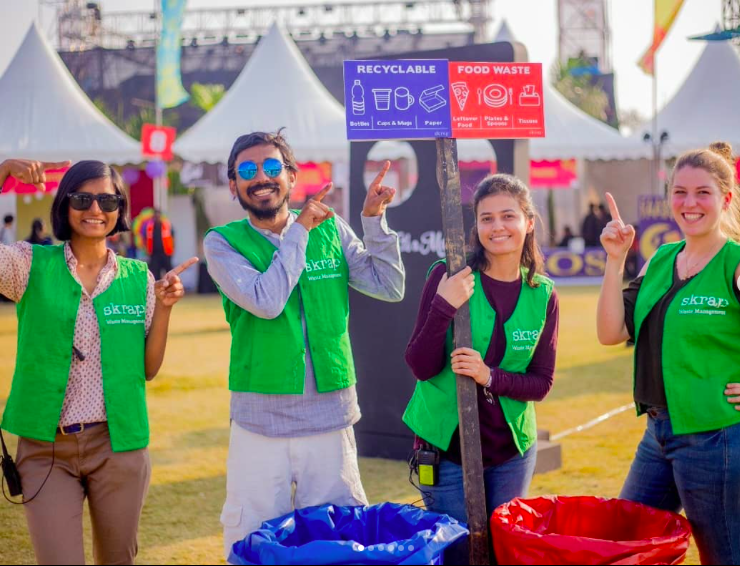
The producer also credited Skrap, an environmental sustainability firm, for making it all possible for her. The brainchild of Divya Ravichandran, Skrap has been helping many big events go eco-friendly. Ravichandran helped Bacardi NH7 Weekender, Meghalaya, and BudX Mumbai become zero-waste events. She started the organisation after attending a music festival organised by a friend. She was baffled by the kind of waste that was produced at events and had decided to do something about it.
“We see a lot of alcohol glass bottles, plastic bottles, paper cups, and disposable plates at music festivals. There’s often a lot of decor waste from festivals. Reducing single-use plastic items, adopting reusable or compostable alternatives, and ensuring that a comprehensive waste management system is in place are some key steps. There are also a lot of leftovers at the food stalls. We run a zero-food waste initiative and share this with low-income communities,” Ravichandran explains.
Food wastage is a serious issue. According to Krishi Jagran, an online news website, every year about 67 million tons of food is wasted in India. So, how is the food industry tackling waste management? Radhika Khandelwal, chef-owner at Fig & Maple Delhi, has made sure her restaurant produces zero waste. “I believe that there is nothing called food waste, as long as it is edible, it is food. Fruit skins, seeds, or spent coffee grounds (SCG) are a few things that typically are thrown away. But we turn these edible ‘food waste’— into bitters at the bar. We’ve also recently partnered with Eka Design Studio, a sustainable clothing brand, to make serviettes for the restaurant using pieces of fabric that would be wasted at their studio,” she tells me.


Siddhant Padte, the co-founder of Nude Food Café in Mumbai, believes in leaving no waste behind. From sustainable packaging to a specially designed compost machine, he along with his partner, Ajinkya More, is doing it all so creatively. “We have a simple cage composting system that helps us to convert all the food waste into organic compost. We have set a target of 5kgs per day limit of food waste, which our team cannot exceed. To date, 3500 kgs of food waste has been converted to compost and not even a single piece of waste is sent to the landfill,” he says.
What makes them unique are the small and amusing efforts they take to make sustainability fun. They request guests to order only as much as they can eat, and they offer attractive discounts to the guests who finish their food completely. And guess what? You also get a discount if you get your own containers to take food delivery or come with your own reusable coffee mug. Padte points out that the food industry needs to look beyond just being economically sustainable. “We need to be more thoughtful about the consumption, respect resources, and value all the ingredients that are used to create a wonderful dish.”
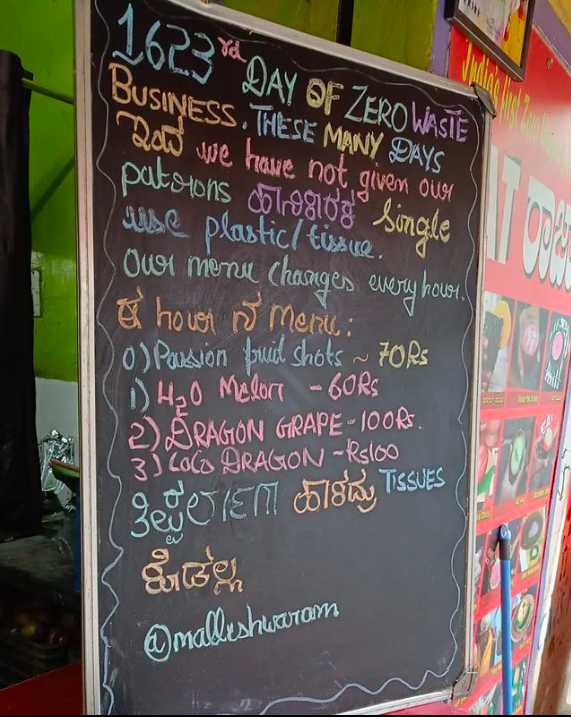


Anand Raj, the owner of Eat Raja, a zero-waste juice bar in Malleswaram, Bengaluru,is already on this course. His sustainable juice counter not only offers fresh and delicious juices but these are served in glasses made out of fruit shells. Raj says his love for nature and for Vani Murthy’s works (a 60-year-old social media personality who is inspiring youngsters to compost and sustainably manage waste) were the reason behind going zero-waste.
Raj explains, “We make sure that the waste is turned into a new product. We have no plastic waste, but the waste items like pulp, coconut shells, fruit waste, or citrus waste are used in an effective manner. It is either turned into cow fodder or turned into compost. The citrus waste is used to make a special bio-enzyme cleaner. The shells are used for aromatic candles. We also try to avoid creating carbon footprints. We have cycles that people can come and paddle to make their own smoothies.”
These zero-waste advocates are proof that each tiny effort in the right direction can eventually make a huge impact. Let’s all add our bits to bring in the change the world needs.
Reproduced with permission from Mansworldindia.com




